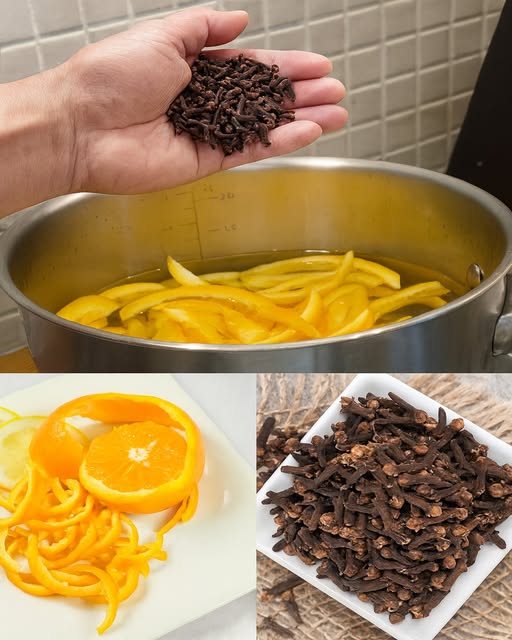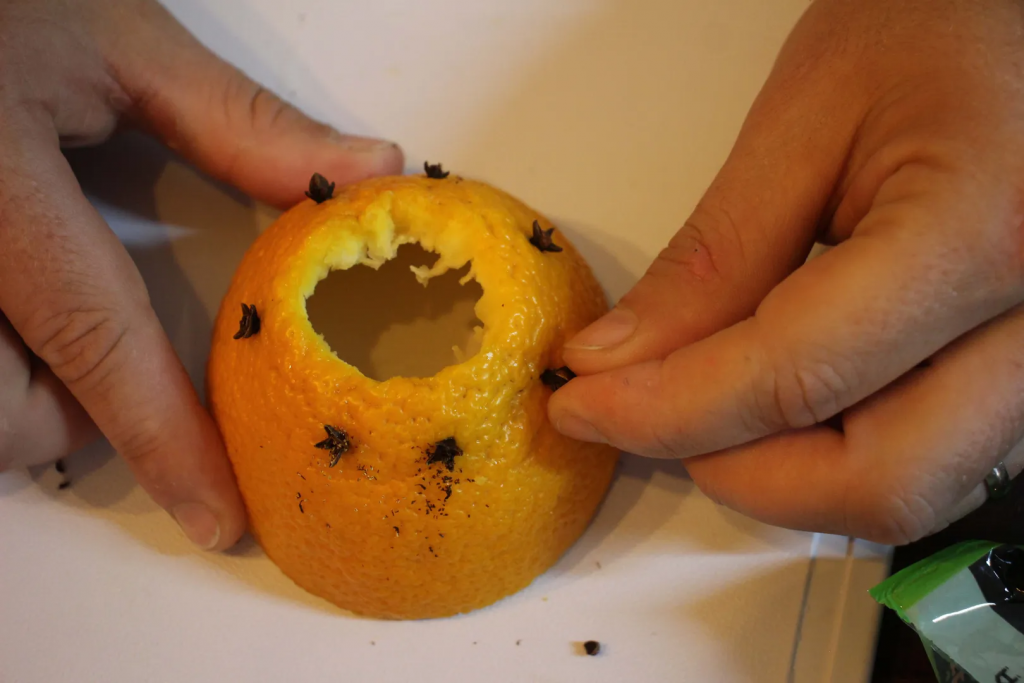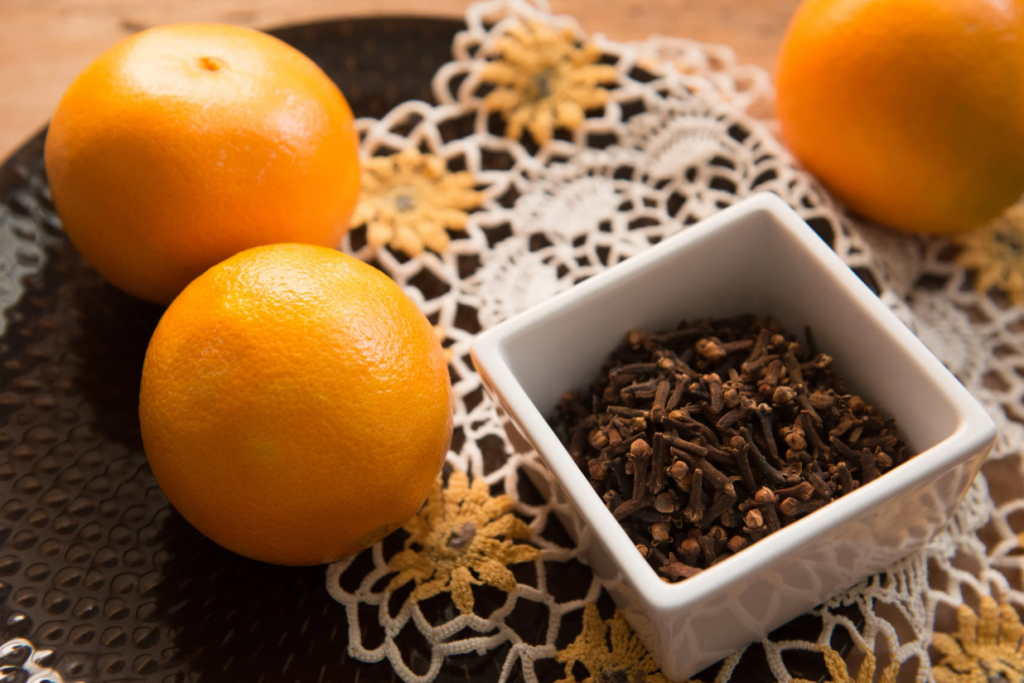Have you ever wondered why our grandmothers boiled orange peels with cloves, filling the house with a warm, spicy, citrusy aroma? This simple ritual is more than just a household fragrance. According to oral traditions and folk remedies, boiling these two ingredients was believed to purify the air, calm the mind, and even support health. In fact, historical records show that citrus peels and spices like cloves have been used for hundreds of years in natural medicine and daily living.
Today, when modern homes are filled with artificial sprays and chemical cleaners, many people are rediscovering these age-old practices for a healthier, more natural lifestyle. Science is also beginning to back up some of the wisdom, showing that compounds in orange peels and cloves may indeed carry antioxidant, antimicrobial, and soothing properties.
In this article, we’ll explore the hidden values of orange peels and cloves, why boiling them together was so common in traditional households, practical ways you can adopt the ritual today, and real-life experiences from people who’ve tried it. By the end, you’ll see why this grandmother-approved tradition still matters in our fast-paced world.

The Nutritional and Aromatic Power of Orange Peels
While most of us enjoy the juicy fruit and discard the peel, the rind is actually a concentrated source of plant compounds.
Key Benefits of Orange Peels
- Vitamin C and flavonoids: Support immune health and protect against oxidative stress.
- Natural essential oils (limonene): Known for uplifting fragrance and cleansing properties.
- Fiber (pectin): When dried and consumed in teas, supports digestion.
- Antimicrobial qualities: Helps fight certain bacteria in natural cleaning uses.
In traditional households, dried or fresh orange peels were boiled not only for their pleasant scent but also for their believed role in promoting wellness during cold seasons.
Why Cloves Were Added
Cloves are among the world’s oldest spices, cherished for their rich aroma and medicinal properties.
Key Benefits of Cloves
- Eugenol: A powerful compound with antioxidant and antimicrobial potential.
- Warming spice: Traditionally used to ease discomfort and support circulation.
- Natural preservative: Helped in keeping stored foods fresher.
By combining cloves with orange peels, grandmothers created a blend that was both aromatic and functional. The cloves added depth to the fragrance while boosting the natural purifying qualities of citrus.
| Ingredient | Key Compound | Traditional Use |
|---|---|---|
| Orange peels | Vitamin C, limonene | Freshen air, soothe digestion, support immunity |
| Cloves | Eugenol, antioxidants | Purify environment, ease seasonal discomfort, promote warmth |

The Tradition of Boiling Orange Peels with Cloves
This practice wasn’t random—it was rooted in wisdom passed down through generations.
Household Ritual
Grandmothers often boiled the mixture during winter months or festive seasons. It filled the home with a cozy, welcoming scent while symbolizing cleanliness and comfort.
Practical Benefits
- Natural air freshener: Eliminated odors without chemicals.
- Mood booster: The citrus-spice aroma created a sense of calm and happiness.
- Seasonal support: Families believed it helped clear the air during cold and flu seasons.
Spiritual and Cultural Symbolism
In some traditions, citrus and spices were also linked to prosperity and protection, making this practice part of seasonal rituals or celebrations.

How to Try This Practice at Home
You can easily recreate this traditional remedy in your own kitchen.
Basic Recipe
Ingredients:
- Peel of 1–2 fresh oranges
- 5–6 whole cloves
- 2–3 cups of water
Instructions:
- Place the orange peels and cloves in a small pot.
- Add water and bring to a boil.
- Reduce heat and let simmer for 15–20 minutes.
- Enjoy the fragrant steam that fills your space.
Variations
- Add cinnamon sticks for a holiday-like aroma.
- Add lemon or lime peels for a sharper citrus scent.
- Simmer longer for stronger fragrance; add more water as needed.

Practical Uses Beyond Fragrance
- Use the cooled mixture as a natural surface cleaner.
- Add to bathwater for a refreshing soak.
- Place cooled peels in closets or drawers as natural fresheners.
Real-Life Experiences
- Maria, 54: “I started boiling orange peels with cloves every Sunday morning. It reminds me of my grandmother’s home and instantly relaxes me.”
- James, 39: “Instead of buying expensive candles, I simmer this mix. The scent lasts for hours, and it feels healthier for my kids.”
- Elena, 28: “I tried using the cooled water to wipe my kitchen counters. Not only does it smell amazing, but it also seems to keep ants away.”
These stories show how this simple, traditional practice can still bring joy and practical benefits in modern homes.
Safety and Considerations
- Avoid overuse: The aroma is strong; use moderate amounts.
- Allergies: Rare, but those sensitive to citrus oils or cloves should be cautious.
- Not a cure: While pleasant and potentially supportive, it’s not a replacement for medical treatments or cleaning agents in cases that require stronger solutions.

Conclusion
Why did grandmothers boil orange peels with cloves? To refresh the home, calm the spirit, and add natural wellness to daily life.
Can you do it today? Absolutely—it’s simple, affordable, and eco-friendly.
Is it just about fragrance? No, it’s also about tradition, comfort, and connecting with natural living.
Any precautions? Yes, use moderately and always remember this is a supportive practice, not a medical cure.
This grandmother-approved ritual proves that sometimes the simplest traditions carry timeless wisdom. A pot of simmering orange peels and cloves doesn’t just scent your home—it brings comfort, connection, and a reminder of how powerful natural living can be.
Disclaimer: This article is for educational purposes only and does not replace professional medical advice. For specific health concerns, consult with a qualified healthcare provider.




